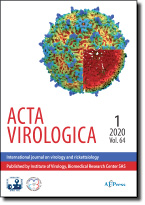Acta Virologica Vol.62, No.4, p.374-378, 2018
|
| Title: Virus neutralization study using H120, H52, 793/B antisera against Iranian infectious bronchitis virus genotypes |
| Author: M. T. Zabihipetroudi, A. Ghalyanchilangeroudi, V. Karimi , R. Khaltabadifarahani, M. Hashemzadeh |
|
Abstract: Infectious bronchitis virus (IBV), a major pathogen of the domestic fowl, exhibits extensive antigenic variation. IBV is a member of the Coronaviridae family and the genus Gammacoronavirus. A new infectious bronchitis virus serotype can emerge from only very few amino acid changes within the major peplomer glycoprotein, namely in its S1 part forming the virion spike. Principally, the serotypes are identified by virus neutralization (VN) tests. This study is aimed to investigate the neutralizing efficiency of H52, H120, and 4/91 antiserum against IBV genotypes (IS-1494, IS-720, 793/B, IR-1) recently circulating in Iran. For the first time, we have used cross-neutralization tests for the serological classification of these isolates. In this study, all antisera failed to neutralize all IBV strains. According to the results of our research, cross-protection studies are necessary for the design of a proper vaccination program for IBV circulating genotypes in Iran. The data are useful for the development of new vaccine strategies.
|
|
| Keywords: avian infectious bronchitis; Iran; virus neutralization |
|
|
Published online: 23-Nov-2018
|
| Year: 2018, Volume: 62, Issue: 4 |
Page From: 374, Page To: 378 |
doi:10.4149/av_2018_404
|
|
 download file download file |
|
|
|
|
 download file
download file
